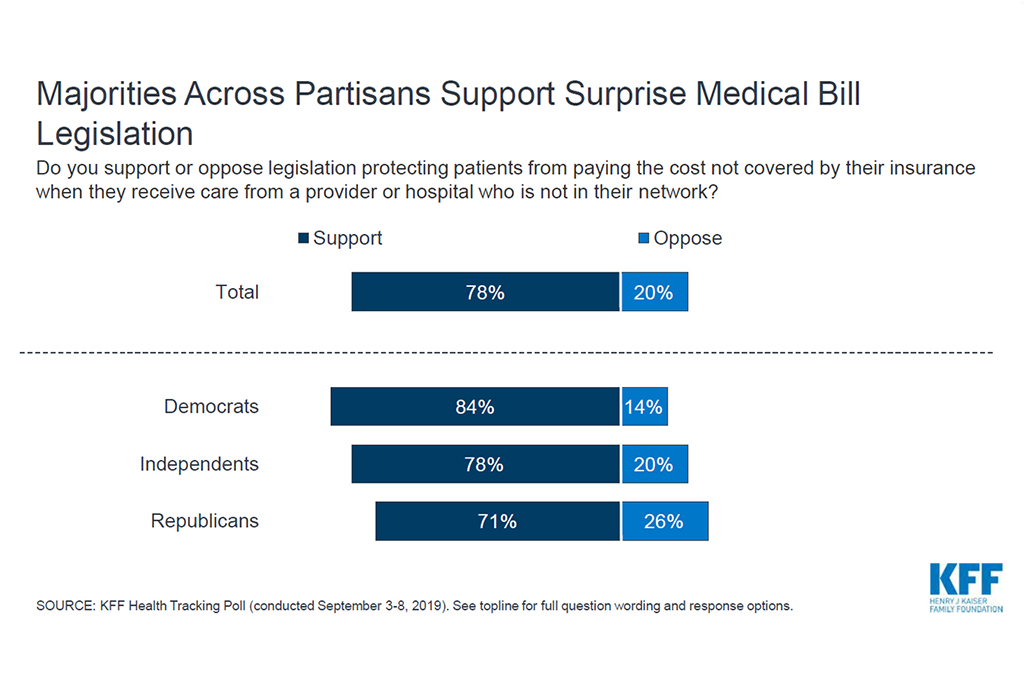Nearly 8 in 10 Americans support legislation to protect people from surprise medical bills, a new poll from the Kaiser Family Foundation shows.
That support persisted no matter which party was asked: 84% of Democrats, 78% of independents and 71% of Republicans said they support surprise billing legislation, according to the poll. (Kaiser Health News is an editorially independent program of the foundation.)
Surprise bills are the unexpected ― and often expensive — charges patients receive after getting care from a doctor or hospital not in their insurance network. The issue has attracted a lot of attention in recent years, with ongoing projects like KHN-NPR’s “Bill of the Month” series and Vox’s look at emergency room bills illuminating the scope of the problem. The White House and both parties on Capitol Hill have expressed interest in finding ways to protect consumers from the practice.
But Congress has been bombarded by relentless attack ads and deep-pocketed lobbying against legislation that would end surprise billing.
And with lawmakers returning to work this week after the summer recess, some of the supporters of legislation on Capitol Hill worry that effort may destroy their chances of passing an effective law.
Critics claim that the primary legislation under consideration — in which a patient’s insurance would pay the out-of-network provider based on the average of what other doctors nearby are paid — would result in doctors and hospitals being paid less.
But the KFF poll found 57% of respondents support passing legislation to address the problem even after hearing the critics’ argument.
And as Democratic and Republican politicians alike discuss dismantling the ACA, whether through implementing a “Medicare for All” plan or ruling the existing law unconstitutional, the poll also found the public has some reservations about making drastic changes to the health system.
Ahead of Thursday night’s Democratic presidential debate, the poll found that 55% of Democrats and Democratic-leaning independents prefer a presidential candidate who wants to build on the ACA. About 40% said they prefer one who wants to replace it with a Medicare for All plan, which some advocates such as Democratic presidential candidate Sen. Bernie Sanders suggest would provide a single health plan for the entire country and replace all private insurance.
Those numbers are nearly identical to the findings in KFF’s last tracking poll in July.
KFF’s new poll showed the polarization that could undermine Democrats’ chances of unifying behind a single presidential candidate in 2020: 14% of Democrats and Democratic-leaning independents said they would vote only for a candidate who wants to replace the ACA with Medicare for All.
It also found 69% of all Americans support a government-administered public option health plan that consumers could opt into, a policy former Vice President Joe Biden included in his health plan. About 41% of Republicans said they support a public option.
That said, the poll shows many respondents do not see the difference between the policies that Democratic candidates are pitching: About 47% said a public option and a Medicare for All plan are similar.
The new poll also shows that support for the Affordable Care Act has hit an all-time high among Democrats, with 84% saying they view it favorably. The ACA became law in 2010.
KFF’s findings confirm that the Donald Trump presidency has galvanized Democratic support for the ACA, former President Barack Obama’s signature domestic policy. The percentage of Democrats who favor the law has increased by 11 percentage points since February 2017.
Among other policy questions, 70% of those surveyed said lowering prescription drug costs should be a major health care-related priority for Congress, and 69% said maintaining the ACA’s protections for those with preexisting conditions should be a top priority.
The KFF poll was conducted Sept. 3-8, with researchers surveying 1,205 adults by landline and cellphone, in English and Spanish. The margin of error is plus or minus 3 percentage points.
This story was produced by Kaiser Health News, an editorially independent program of the Kaiser Family Foundation.
